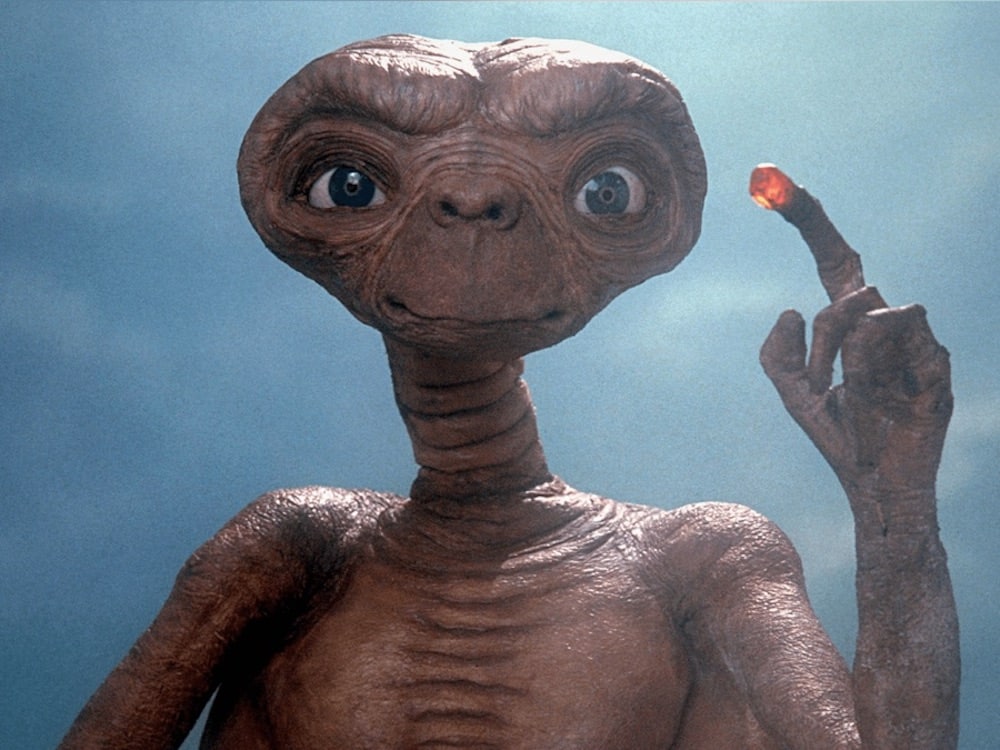Steven Spielberg has managed to make several beloved and timeless films; Jaws, Raiders of the Lost Ark, Jurassic Park, Saving Private Ryan but none are more beloved than E.T.: The Extraterrestrial. Released in 1982 to massive critical acclaim and incredible box office numbers, E.T. became a film that spoke to generations and became not only a landmark science fiction film but a benchmark of filmmaking comparable to Casablanca, The Godfather and Citizen Kane. For E.T.’s 40th anniversary, let’s look back and dissect what made E.T. so beloved and its impact on culture.
Following its theatrical release on June 11, 1982, E.T. would gross $619 million worldwide to become the highest grossing film ever at the time. It would also gain $128 million during subsequent re-releases in 1985 and 2002 with more money expected from an additional re-release on IMAX screens scheduled for August 2022. The contemporary reviews were overwhelmingly positive with Roger Evert giving it 4 out of 4 stars and Leonard Maltin naming it one of his must see films of the 20th century but critics were not the only ones who showed love for the film. President Reagan and First Lady Nancy Reagan held a screening for it at the White House, Princess Diana was supposedly moved to tears after watching it and Spielberg was present at a screening for the United Nations after which he was awarded a UN Peace Medal. It was nominated for nine Academy Awards but would lose to Gandhi for the prize of Best Picture. Gandhi”s director, Sir Richard Attenborough, remarked that he did not believe his film would win and thought E.T. was the rightful winner. E.T. is a film that crosses generations to appeal on themes such as childhood, family, love and discovery but let’s break down what made E.T. into a powerful film.
Following the success of Jaws, Steven Spielberg would direct two additional landmark films; Close Encounters of the Third Kind and Raiders of the Lost Ark. Close Encounters would be the director’s first foray into the science fiction genre and would re-define it over many years. Aliens are a particular favorite of Spielberg and after Close Encounters, he sought to make a film inspired by his childhood. Following his parents’ divorce as a young child, Spielberg adopted an alien as his imaginary friend and began to put his experience on the big screen with the help of producer Kathleen Kennedy and screenwriter Melissa Mathison. Spielberg and Mathison met on the set of Raiders of the Lost Ark as she was dating Harrison Ford a the time and was approached to write the script based on Spielberg’s idea.
While Kathleen Kennedy is known as a legendary producer now, E.T. was actually her first credit as a main producer on a major film. Prior to this, she had been working as Spielberg’s secretary and even received associate producer credits for Raiders of the Lost Ark and Poltergeist. She got onboard to Spielberg’s vision and helped him get production rolling. In watching E.T. now, it is remarkable to see how the child actors, Henry Thomas, Robert MacNaughton and Drew Barrymore, really carry the emotional weight of its scenes. Obviously, E.T. and Elliot share an emotional bond but Elliot is never scared of E.T. save for a brief encounter at night in a corn field and therefore tells the audience we should not be afraid of him either. It also helps that the most advanced animatronics of the 1980’s created a non-threatening, believable puppet that holds up even against the scrutiny of modern audiences.
Like all great and timeless films, the themes are drawn on deeply personal themes of family, reconciliation, love and discovery. At the heart of the film is the Taylor family who are still reeling from the breakup of their mother and father. The pain is still fresh on mother Mary’s face as Elliot and Gertie inadvertently mention their father is on vacation with a new girlfriend. Mary is doing her best to hold the family together by staying positive and holding down a job as a single mother. Older brother Michael is also doing what he can to support his mother but at the same time, he is a fifteen-year-old boy who wants to spend time with his friends and play football. E.T. enters their lives at a precarious moment, encourages Elliot to be curious about his world and to help others and manages to heal the Taylor family and leave them in a better state than they were found.
On top of very powerful and resonant themes, E.T. is comprised of absolutely brilliant filmmaking. Spielberg shot the film in chronological order which is a rarity for any production. This was done in order to bond the actors during the course of the story. There is also the collaboration of Spielberg and composer John Williams to consider. Without the work of Williams, E.T. is simply not the same. The climax of the film, beginning with the escape from Taylor’s home, is over 20 minutes of action and musical fanfare and remains one of Williams’ most indelible and memorable work. Without question, the most of Elliot taking flight on his bicycle is the most iconic moment of the film and has no effect were it not for Williams’ soaring fanfare. The final farewells at the end are emotional by themselves but Williams adds the right touch to punctuate them. Williams absolutely deserved his Oscar win for Best Original Score for his work on E.T.
After 40 years, E.T.’s emotional impact is no less than it was after its original release. Perhaps it is because E.T. exists as a standalone film without the weight of a sequel to drag around. Universal initially approached Spielberg to produce a sequel but he ultimately decided against this as the film ended with no questions about a possible return for the little alien. There was an odd five-minute commercial that featured actor Henry Thomas but this is not considered an official sequel. That is not to say that Universal has not capitalized on E.T.’s success. It is estimated that E.T. has generated over $1 billion in merchandise sales as well as over $250 million in home media sales. There is also the story of the ill-advised video game adaptation that was so awful that it is credited as one of the factors for the collapse of the video game industry in the early 80’s. This even fueled rumors that the game’s cartridges were buried in a New Mexico landfill which were proven true in 2014.
E.T. is not only a remarkable science fiction film but an incredible film without genre. It is a story that has captivated audiences for generations and will continue to have a hold over viewers. It is not only a story of how a lost alien helps to heal a broken family but how a director at the top of his game cemented his legacy as a master storyteller, how two women helped bring this story to life, how a legendary composer crafted iconic imagery and how audiences fells in love with a little alien who just wanted to return home.
Featured Image Credit: Apple TV



